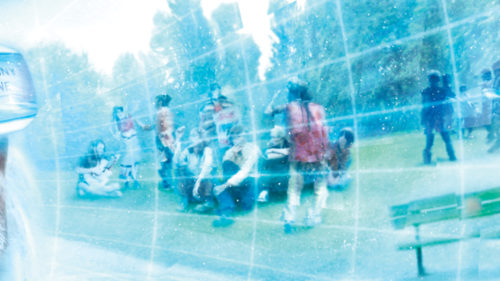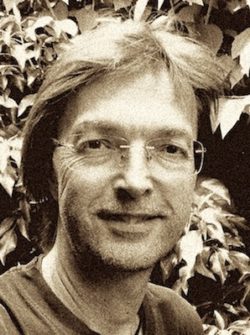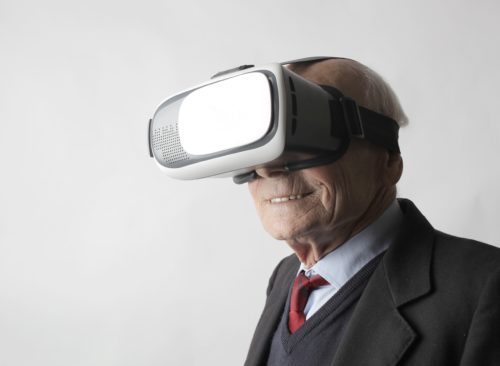
latest
Fictions: Goodbye
Goodbye
Read the first instalment in our Fictions series.
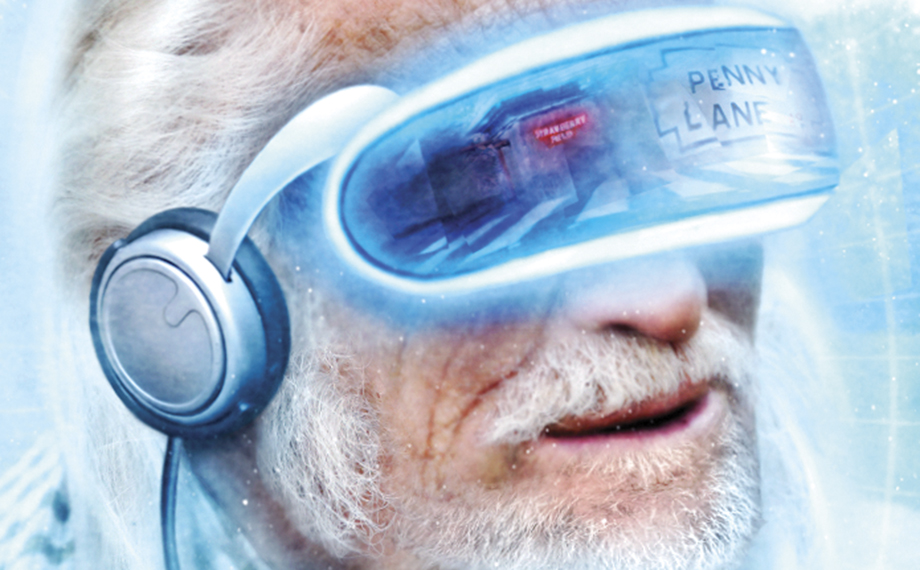
Text by Stephen Palmer, artwork by Vincent Chong.
Fictions: Health and Care Re-Imagined presents world-class fiction to inspire debate and new thinking among practitioners and policy-makers. To find out about the project, the authors and to read other stories in the collection, click here.
Read the associated “Getting Real” blog, exploring the technology, science, policy, and societal implications of the themes from the story here.
Goodbye
Stephen Palmer
As we walked along Penny Lane we saw a stack of Oz magazines burning.
Liverpool was quiet that evening. Dad had tears in his eyes as he passed his hand through the smoke, shrugged his shoulders, and said, “Goodbye.”
I didn’t know what to expect. We were a typical British family, so Dad brought us up to hide more than we showed. There’d been occasions in the past – a couple of funerals, my sister Ellen’s wedding – when there’d been tears, but those were exceptions. So why had Dad chosen to do this… and in Liverpool?
He wore a tatty old tie-dye shirt and jeans, his white hair loose around his shoulders, his beard and moustache combo still showing a few dark hairs. We’d all seen the photos from the sixties, when he and Mum went to the Isle Of Wight festival and saw Jimi Hendrix. We knew his style. As I watched him walk to the end of Penny Lane he seemed half that young man, half this old man.
But I suppose that was the idea.
We didn’t know Liverpool’s street layout, so we just followed him. At the end of Penny Lane he halted and glanced up. I followed suit, and behind the clouds I thought I saw a yellow shape, like a fat aeroplane… then it was gone. Tears streamed down Dad’s cheeks.
I began to feel nervous. This was so unlike Dad, unlike our family. He’d never spoken about the end. Then Ellen touched my shoulder and said, “It’s what he wants.”
I nodded. My sister was the one most in touch with her feelings, and she’d always had a special understanding of Dad and his ways. Yet I wondered if even she’d not expected this.
I turned around to survey the crowd. There were forty at least. Brave people, most of them Dad’s age. Would this walk through Liverpool influence their own choices?
Dad halted in front of a gate made from corroded steel bars. A sign said: Strawberry Fields. This one, I recognised. This was the Lennon one. I knew the Beatles of course, and had grown up with them because of Dad, though their music wasn’t my kind of thing. But for Dad, these Liverpool locations were inextricably entwined with his identity. I began to realise then what this trek was all about.
As we watched, the sign detached and floated into the air, the gate following moments later. Distant music – a swarmandal, a brass section, McCartney’s unique flute mellotron – drifted down the street to enfold us in nostalgia. Then Strawberry Fields, that entire place, walls, bushes, trees and all, rose from the ground and ascended into the sky. There was no noise of destruction, no wrenching of tree roots, no smash and tumble of bricks, just the stately ascent of Lennon’s turf into the blue, blue sky, where it darkened, faded, then vanished.
Dad wept, and Ellen went to hug him.
I stood still, not sure what to do. My brother James glanced at me, but at once looked away. He was indifferent, I guessed. In a terse email he’d told me and Dad that he was only attending because he was curious about the technology.
Some of the crowd behind us also cried – old men, old women.
James, unmarried, stood alone. Ellen’s two children looked a bit scared.
My wife Ceri stood a little way back, our kids Billy and Rhiannon at her side. We’d agreed before arriving that I should stand apart, ready for Dad if he needed me. Now though, that didn’t seem such a good plan, so I waved Ceri and the kids forward and we stood together as we watched Dad and Ellen.
Dad walked to the end of the street, turning the corner. We followed, pretty quick, anxious to keep up. I didn’t look away to see what had happened to the location formerly occupied by Strawberry Fields. Moments later, we walked into Golden Gate Park.
This was more my sort of place – I’d worked for a couple of years in San Francisco, and knew the reputation of the city. We followed Dad as he wandered through the park towards Hippie Hill, and as I looked around I thought I saw the ghost of Harrison watching us. Then the shade vanished. I glanced at Ceri, knowing from the expression on her face that she’d also seen Harrison. This was all planned.
I felt apprehensive then. Seeing Dad cry made me think I ought to be crying too. But I was of the generation below my dad – Liverpool, Oz, the Beatles and Golden Gate Park didn’t have the resonance for me that they had for him. Anxiety filled me. Not knowing how to react, I began to feel exposed: Dad’s eldest son, whom everyone would be watching.
I felt sad, yet not weepy-sad. I felt nervous.
Ceri held my hand. Thank goodness. She understood.
“Oh, yes, I can tell you something,” she said, winking at me.
“He still believes in peace and love,” I replied. “That’s what he’s telling us.”
“One of the things, yes,” she said.
As the unmistakeable voice of Scott McKenzie drifted down from Hippie Hill, I noticed both Dad and Ellen had flowers in their hair. Wanting to identify with him, to empathise, I plucked a few blooms from the fronds around me and set them in my own hair and in Ceri’s. She smiled at me.
“It’s not just about being sad,” she said. “He wants us to accept the legacy. He wants us to be inspired.”
“Do you think that’s what this is all about?”
She looked away. “It’s about many things,” she replied.
I heard a hint of disappointment in her voice. Concerned, I pondered her words. She was right, of course. Why was I limiting this experience to one thing, one motive, one point? Life was a multitude of experiences. So should Dad’s thing be also.
As we walked out of Golden Gate Park it buckled, twisted, then rose a few feet. Moments later the entire park ascended, rising en masse into the sky, which in response darkened as it accepted the land. Then, as that tiny silhouette became a black point and vanished, the sky turned blue and whole again.
Before us, we saw an ugly scar. Nothing had replaced Golden Gate Park; and I knew the same applied in Liverpool. Nothing could replace Strawberry Fields. Nothing could replace Hippie Hill in Golden Gate Park. No dream had come along to replace peace and love.
Dad wept again, and Ellen hugged him.
Still I felt unsure of what to do. James caught my gaze, but as before he looked away at once. He appeared uncomfortable – embarrassed, I thought. He stood further away now. It was clear to me though that the occasion was having a far greater impact on him than he’d guessed.
I studied the great scar. This, I knew, was part of Dad’s point. The innocent beauty of Golden Gate Park and all it represented had gone, forever, and all that remained was a dark, brooding, hideous scar.
I felt cold.
Nearby I saw Haight Street rising into the air, soaring into sunshine, darkening as it rose, then fading and vanishing. The whole Ashbury district followed. In various regions of San Francisco dark shadows lay where once there had been rainbows and light, darkness that was the cultural effluvia of social scars.
I comprehended then what Dad’s young years meant to him. I grasped the scale of the thing he was saying goodbye to. I felt chastened. He had lived a life.
Then he turned to us and said, “I want to go home now.” He paused, glancing back at the city. “The dream is over.”
As he spoke, I’m sure I heard an echo of Lennon’s voice saying the same thing.
We hurried across a road and turned into a street. Halfway along I saw a white VW Beetle and a zebra crossing, which Dad led us across. Though his face was wet with tears, there was an ironic grin there also, and maybe a twinkle in his eye. The rest of the family crossed, then the crowd too, and they began to chatter to one another as they did. I noticed that a lot of the older people smiled, and even laughed as they skipped along the zebra crossing. One man took his shoes off. I knew a joke was being relayed from one old hippie to another. Paul’s alive!
I smiled. Understanding that this wasn’t meant to be a sad part, I grinned at the man as he put his shoes back on. Ceri squeezed my hand.
Then Dad said, “This is where it ends. I said goodbye. Now we have to return. But before we do… one last thing.”
A hush descended over the street. Not sure what to do, I studied the graffiti on the wall outside a large building, which Dad now stood in front of. It was, I realised, a recording studio. Then Dad raised his arms and gave a few waves, whereupon the strains of La Marseillaise sounded, played by an invisible brass band.
I knew the imminent song, of course, but then to my amazement Dad began to sing. At first he sang just one word, repeated a few times: Love. His voice was weak, and for a few moments he was well out of tune, but then his singing became stronger. I stared, watching his bearing change from that of an old man to the vibrant youth he’d once been. As they realised what was happening, the crowd joined in. The lyrics to the song appeared on the front door of the recording studio, glowing golden bright in evening gloom, and everybody who knew the tune sang, me included. Amongst the crowd there was not a single dry eye.
The beautiful song ended with a single refrain, repeated by Dad, us, and the crowd in unison.
The music faded.
Twilight deepened into night.
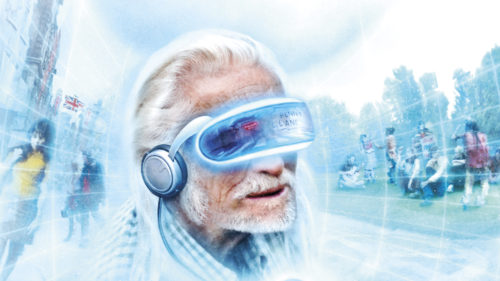
I reached up and removed my VR headset.
Dad lay half-comatose in bed, his long hair flowing out across the pillow, his mouth open, tongue lolling, as he continued to speak the words of the song. Near me other members of the family removed their own VR headsets. I glanced around, wiping my cheeks with a tissue. Some of the people further back I recognised – old hippies in the virtual crowd, Dad’s closest friends from the sixties. Ceri sat next to me, our kids behind us.
The life support AI whispered to itself as machinery ticked and gurgled. Blue traces flickered across curved computer screens. Two nurses stood at the rear of the room, their hands clasped in front of them, faces solemn.
Ellen stood and leaned over the bed, pulling the pillow up then removing Dad’s VR headset. One of the nurses hurried forward, then she and Ellen lifted and pulled Dad a little, so that he could sit up and, as best he could, face us. The nurse wiped tears from his cheeks, patting his mouth with the tissue then retreating.
“Thank you all for coming,” he said.
His voice was weak; I strained to hear him. But his eyes were clear, and I knew he was lucid. I glanced at Ceri as she dabbed a tissue at her eyes. Behind me Rhiannon also cried, but Billy just looked frightened. I turned back.
“I’ve spent most of my life avoiding pain and sadness,” Dad continued. “When I thought back, and realised that, I decided to do something different when it came to the end.” He smiled. “Something out of character.” He coughed. “For an old British hippie, anyway.”
He reached out to the glass of water at his side, which Ellen picked up, placing it at his lips so he could take a sip. I felt nervous, embarrassed too, that Dad was actually speaking to us.
“I don’t believe in an afterlife,” he said, looking at me, “so I got in touch with a humanist chap called Paul. This isn’t a VR charade, it’s a living funeral.”
He looked up at Ellen, then across the room at one of the old men. I saw the man who’d taken off his shoes nod once, then smile.
After a few moments Dad continued, “Then I thought… what a shame that I couldn’t be at my own funeral, in part, you know… to invite people and show them what they’d really meant to me. I knew that would be difficult for most people, but I wanted to face the truth – the good and the sad – and get it out in the open. For all of us. Not just me.”
He paused, breathing deep.
“So in the end I decided to go for a living funeral. It’s more meaningful p’raps than an ordinary one. I designed it all, you know, mostly for myself, but also for you all… friends, and, I suppose, family. Not that there’s any hippies in my offspring.”
He glanced at James, then at me.
Silence.
I said, “I understand Dad. Peace and love, the basic message. That’s something we’ll always remember.”
He shrugged. “I doubt it. The world’s moved on. That’s why I wanted to say a last goodbye to everything that really meant something. To me and all my friends… the last of the old guard. Songs… live on.”
I nodded. “It means something to me. But I haven’t really had the opportunity to show it.”
He glanced at me, then across at James. “No,” he said. “We did a lot of that in our family, not showing things. It’s another reason I decided to have a living funeral.”
Ellen gave him a second sip of water.
“Everybody who’s here means something to me, and I want them to know it. You can be sad or happy about that as you see fit. I don’t mind. But, you see… none of you would have known if I’d just had an ordinary funeral. After I got my diagnosis I came to realise that death is part of life, and you have to accept that. It’s not just the event at the end, it’s an integral part of the whole thing. You live, you die. So a living funeral seemed right. It seemed meaningful. And… perhaps we’ve lost a lot of meaning in the modern world. Too much meaning. The awful thing is… we’re pretty much dead without it. That’s what gave me the inspiration for designing my living funeral.”
James glanced at me, shifting in his chair. He said, “What do we do afterwards?”
Dad stared at him. “In Japan,” he said, “people who’ve had a living funeral expect nothing afterwards – including a funeral. So I suppose you can do what you like. This is the funeral, James.”
James nodded, but said nothing.
“You look a bit embarrassed, James.”
James shrugged. “I’m sorry I wrote that email to you. I didn’t realise it was going to be like this. Now we’ve done it… I wouldn’t have missed this for the world.”
Dad glanced at me.
I looked at him, but I felt I’d already said what meant most to me. Nevertheless, I sensed he wanted something, some word or two to connect us one final time.
I said, “Peace and love. It will always mean something to some people.”
He nodded. “Ellen will stay with me,” he said. “Thanks again for coming. Goodbye.”
He closed his eyes.
Ellen sat down at his side, and for a moment I thought she’d reach out to hold his hand. But she didn’t.
Then Ceri tugged me away. Already the people at the rear of the room were leaving. I watched them go, then looked at James. He turned away.
“James,” I said.
He turned back. “What?”
He didn’t seem happy. I said, “He’s awake, he’s listening to us. He wants our response. So far, all we’ve done is attend his funeral.”
He looked distressed. “I messed up,” he said. “Do you think Dad’ll forgive me for sending that email?”
“Of course he will.”
James nodded, biting his lower lip and looking at Dad. “I’ve got an idea,” he said. “I need to show him I really do care, and I’m glad I came here.”
“What idea?” I asked.
James took my hand and walked me back to the bed. “All of us,” he said, “the whole family, we need to touch him all together. Then we’ll have a last memory of our own, a family memory to take away with us.”
“I’m not sure Dad wants that,” I said. “He designed the whole thing. It’s over now. Anything we did would be interference.”
“But we’re participants,” he insisted. “Come on, just this one final thing. Then we can all leave, and the living funeral really will be over.”
I hesitated, looking at Ellen, who held my gaze. But then I realised James spoke true. He’d been touched by the living funeral – he’d been changed, as had I. So I said, “You’re right, let’s do it. You, me, and the whole family.”
Dad didn’t open his eyes. I glanced over, to see that he was still breathing. The AI monitor beeped. Still alive.
We all stood around Dad’s bed and reached out. Part of me wanted to look away or shut my eyes so that I was shielded from the emotion, but I forced myself to look. Dad hardly moved. To this day I don’t know if a smile played across his lips or some other accidental motion. I didn’t cry, or even want to cry. It wasn’t that kind of moment – more about bonds than fading bonds. I hoped Billy and Rhiannon especially would be touched by the message of peace and love.
Then we all stepped back and shuffled away from the bed. I held Ceri’s hand and Billy’s as I walked away.
It was over.
He’d said goodbye.
We’d all said goodbye, and he was there to hear us.
